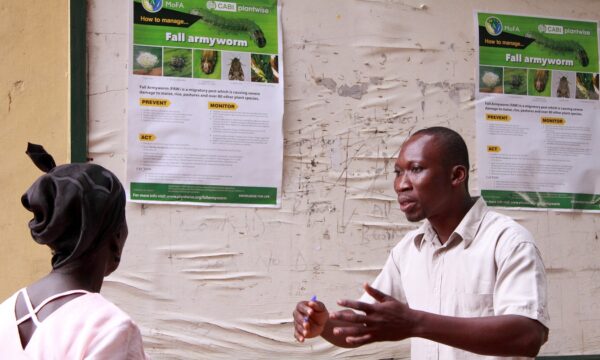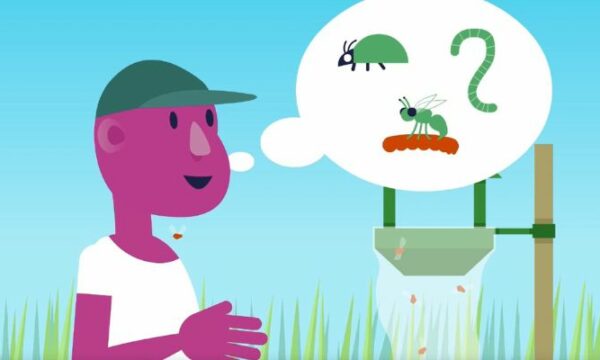
Southern armyworm (Spodoptera eridania) – a pest which is prevalent in Brazil ©Lyle J. Buss/University of Florida
CABI is joining an international team of scientists, led by the University of Stirling, to take a ‘revolutionary approach’ in attempting to tackle resistance to pesticides in insects with a specific focus on crops pests in Brazil.
The £620,000 study will see UK-based Dr Belinda Luke working on the mass production of fungal biopesticides and formulation development from CABI’s laboratories in Egham, Surrey, while Dr Yelitza Colmenarez, and Natália Corniani – from CABI’s centre in São Paulo, Brazil, will disseminate a range of associated training activities.
Pesticide resistance is a serious problem for the agriculture industry worldwide, with pests consuming between 10 and 20 percent of all global crops while growing or in storage. In Brazil, the agricultural economy loses approximately $17.7 billion (£13.6 billion) a year to outbreaks of insects and other arthropod pests in crops. The country’s agricultural sector heavily relies on widespread pesticide application, which has led to the evolution of pesticide resistance in several significant pests.
The team – led by Principal Investigators Dr Luc Bussière, of Stirling’s Faculty of Natural Sciences, and Ricardo Polanczyk, of São Paulo State University (UNESP) Jaboticabal – will attempt to tackle the problem by studying interactions between insects and fungal pathogens that are used as biopesticides to control crop pests.
Dr Luke, Principal Scientist, Biopesticides Team, said: “CABI are delighted to be working with Stirling University and São Paulo State University in this exciting project bring together evolutionary biology and applied biopesticide development to help Brazil develop suitable alternatives to chemical pesticides.”
Dr Bussière said: “Widespread pesticide application – and pesticide resistance in pests – can undermine the sustainability of important crop pest control technologies, reduce associated economic returns, and exacerbate the risks to economic productions and food security.
“Traditional insecticide resistance management tries to prevent insect evolution, but our revolutionary approach promises sustainable control, while accounting for local evolution of insect pests.”

Pesticide application equipment being readied in Albania ©CABI
Insecticide resistance evolution occurs when a single control agent – or pesticide – is applied over a broad area and consistent evolutionary pressures drive rare resistance genes to spread rapidly through the pest population.
The new project – Enhancing Diversity to Overcome Resistance Evolution (ENDORSE) – will investigate the use of multiple fungal biopesticides across agricultural landscapes so that selection for resistance varies in different locations – preventing a uniform evolutionary response.
In natural environments, insect species are genetically variable and few individuals have genes to resist pathogens. The project is inspired by this fact and seeks to make the agricultural landscape more diverse, so that the pressures favouring resistance evolution are temporally and spatially variable. This could allow us to use the next generation of biopesticides for many years without consistent resistance evolution.
The team will also consider the suitability of fungal biopesticides for industrial scale production and field application in Brazil, and provide the industry with innovative solutions for crop protection, including improved delivery systems, higher pest control consistency and enhanced performance under field conditions.
In addition, the study will identify the barriers preventing the uptake of these new pest control technologies and research methods to encourage farmer behavioural change. The research will also provide economic and social science data to underpin policy recommendations regarding incentive schemes, publicity campaigns and marketing strategies.
Dr Bussière and Dr Polanczyk are supported by Matt Tinsley, Rosie Mangan, Brad Duthie and Nils Bunnefeld, all from the University of Stirling; as well as Belinda Luke (Centre for Agriculture and Bioscience International (CABI) UK), Leonardo Fraceto (UNESP Sorocaba), Renata de Lima (Sorocaba University), Yelitza Colmenarez (CABI Brazil), and Natália Corniani (CABI Brazil).
The study is jointly funded by the Biotechnology and Biological Sciences Research Council, the São Paulo Research Foundation, and the Newton Fund.
5 Comments
Leave a Reply
Related News & Blogs
“Use of any pesticide comes with some risk, but this risk can be reduced”
Pesticides are a widely used pest management option. However, if applied incorrectly, they can pose serious risks to human health, ecosystems, and food safety. From farm workers and consumers to pollinators and waterways, the impacts of unsafe pesticid…
30 June 2025





[…] CABI collaborates on innovative approach to tackling pesticide resistance evolution […]
I could use your opinion on something that I am working on. I was reading about a study which says that pests are becoming resistant to pesticides due to the overuse of chemical-based pest control methods. The article mentioned CABI and stated they were joining an international team of scientists led by the University of Stirling in trying to tackle resistance to pesticides in insects with a specific focus on crops pests in Brazil.
What do you think? Is this kind of innovative approach going towards sustainability or is it too late for that? It made me wonder how Sustainability will play out in the future and what role small businesses like mine can play as well. Do you have any advice or information about this subject?
This is like something out of a bad sci-fi movie from the 50s. So glad to read that there are smart people taking the lead here.
I found your blog to be really informative and helpful. Thank you for providing this information! I think it is so important that people are aware of what’s going on with agriculture and food production in Brazil. Looks like something we should all be paying attention to, eh?
This was very well written and totally informative. I feel we need to all be aware of what’s going with food production around the world. Globally we are all affected – good or bad. Thanks.